Do you toss and turn at night, struggling to fall asleep? Or perhaps you wake up feeling groggy and unrested? If so, you’re not alone. Sleep issues are common, but what if there was a natural, accessible solution to help you catch those elusive Z’s? Enter meditation.
In this article, we’ll explore how meditation can help you drift off into a peaceful slumber and improve your overall sleep quality. From mindfulness meditation to Yoga Nidra, we’ll dive into various techniques and their benefits, as well as expert opinions, real-life experiences, and tips for beginners.
So, let’s get started on the path to a better night’s sleep through the power of meditation!
The Impact of Meditation on Sleep
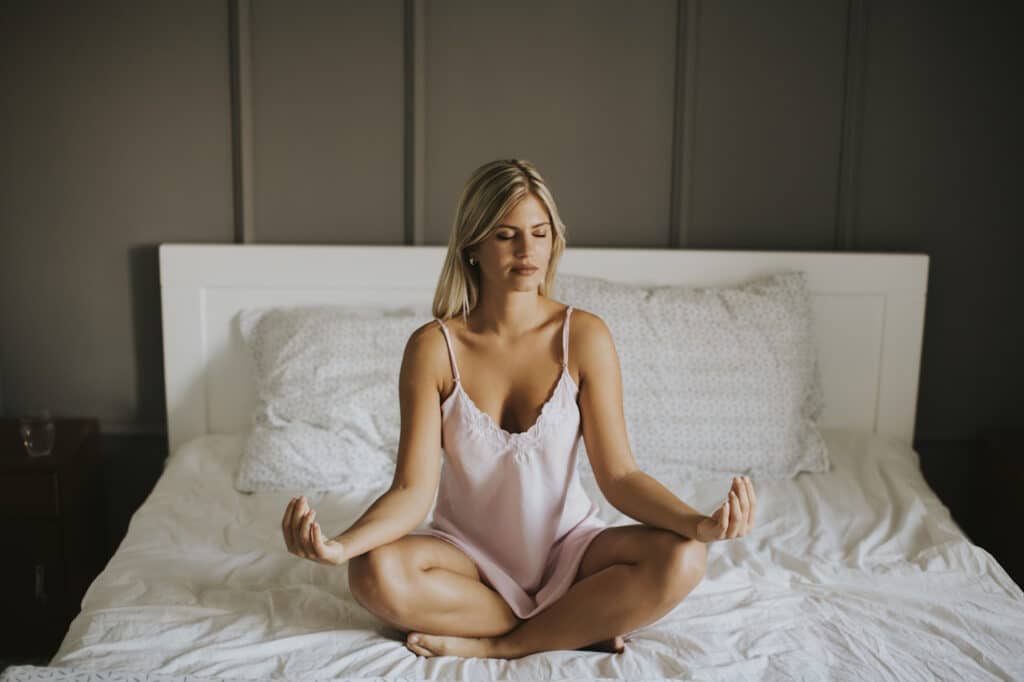
Meditation has long been recognized as a powerful tool for relaxation and stress reduction. But did you know that it can also help you fall asleep faster and enjoy better sleep quality? Meditating before bed can calm your mind, making it easier to drift off into a peaceful slumber. Furthermore, practicing meditation has been linked to improved emotional health, reduced negative thoughts, and better focus, all of which can contribute to a more restful sleep.
Meditation techniques like mindfulness meditation and guided meditation are particularly useful for addressing sleep disturbances and promoting the relaxation response. These practices help you consciously relax your body and quiet your mind, allowing you to enjoy a good night’s rest.
Mindfulness Meditation
Mindfulness meditation, one of the effective mindfulness practices, is all about being present in the moment without judgment. It can help you refocus your mind on physical sensations and your surroundings, rather than getting caught up in unhelpful or negative thoughts.
Mindfulness meditation can enhance sleep quality by addressing sleep disturbances and promoting awareness. Incorporating mindfulness meditation into your bedtime routine can help you let go of the day’s stress and ease your mind into a state of relaxation, paving the way for a more restful sleep.
Consistent practice could help reduce negative thoughts and boost your overall sleep quality.
Guided Meditation
Guided meditation is another effective technique for promoting relaxation and better sleep. This form of meditation uses audio recordings to guide your thoughts, breathing, and imagery, helping you create a sense of peace and well-being.
Following the audio recording’s guidance calms and focuses your mind, enabling a more relaxed state. Over time, this consistent meditation practice can lead to reduced stress and anxiety, better sleep, and increased concentration. It’s a great way to unwind before bedtime and set the stage for a restorative night’s sleep.
Meditation Techniques for Better Sleep
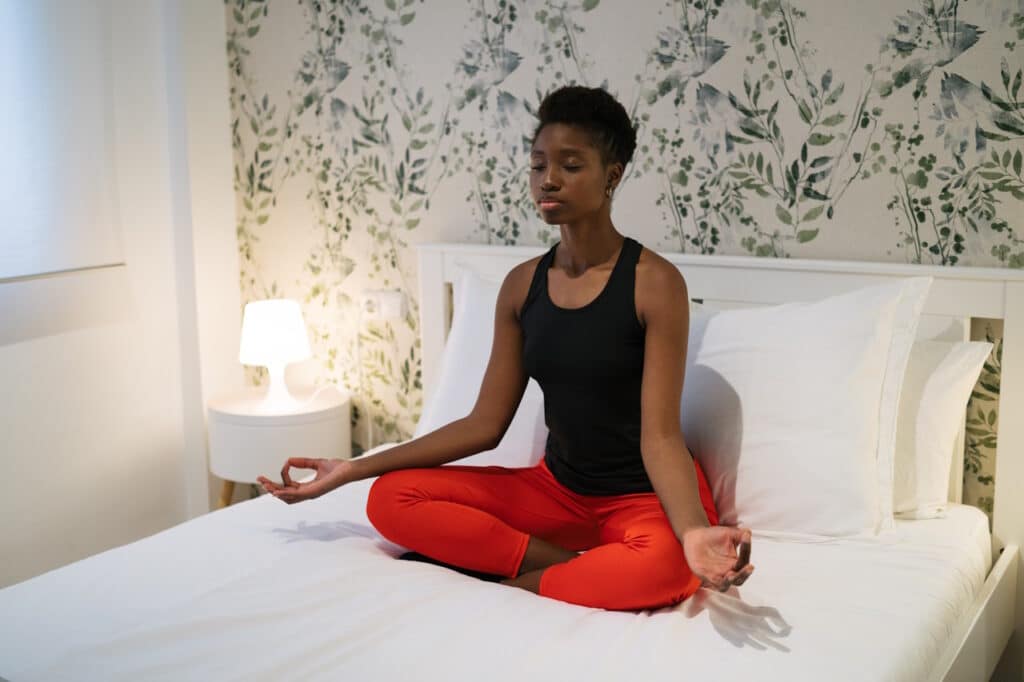
While mindfulness and guided meditation are excellent techniques for improving sleep, there are other practices specifically designed to help you drift off into a peaceful slumber.
Yoga Nidra, Body Scan Meditation, and Mantra Meditation are three popular techniques that can help you relax and prepare your body for sleep. These meditation practices address both anxious thoughts and physical tension, making it easier to fall asleep and enjoy a restful night.
If you’re dealing with sleep disturbances or seeking a more restful sleep, these meditation techniques could be an excellent addition to your bedtime routine. We’ll delve into each technique and its potential to help you attain a more restful sleep.
Yoga Nidra
Yoga Nidra, also known as “yogic sleep,” is a deeply relaxing practice that combines meditation, self-inquiry, and deep relaxation. It’s designed to help you slow down and unwind, guiding you to a state of consciousness between being awake and asleep. This state of relaxation can improve sleep quality and reduce the time spent awake in bed.
Adding Yoga Nidra to your bedtime routine could offer several benefits, such as stress reduction, enhanced sleep quality, and heightened mindful awareness. As you practice consistently, you’ll likely find it easier to let go of the day’s stress and drift off into a peaceful slumber.
Body Scan Meditation
Body Scan Meditation is a mindfulness practice that involves checking in with your body and noticing any sensations, tension, or discomfort. This technique helps you become more aware of your physical sensations and promotes relaxation and focus on the present moment.
Focusing on your body and releasing tension make this an ideal pre-sleep meditation technique. Practicing Body Scan Meditation regularly can help you relax, ease tension, and ultimately improve your sleep quality.
For beginners, it’s best to start with short body scan meditations and work your way up, making sure to find a comfortable and relaxed spot for your practice.
Mantra Meditation
Mantra Meditation is a technique in which you repeat phrases or words, called mantras, to help relax and focus your mind. You can say them out loud, chant them, whisper them, or simply repeat them in your head. This repetition helps clear your mind and brings a sense of peace and clarity, preparing your mind for sleep.
Consistent practice of Mantra Meditation could lead to:
- Less stress
- Improved focus
- A more relaxed state
- Better sleep
When starting your consistent meditation practice, be patient and focus on the mantra, allowing yourself to gradually build up your meditation routine.
When to Practice Meditation for Sleep
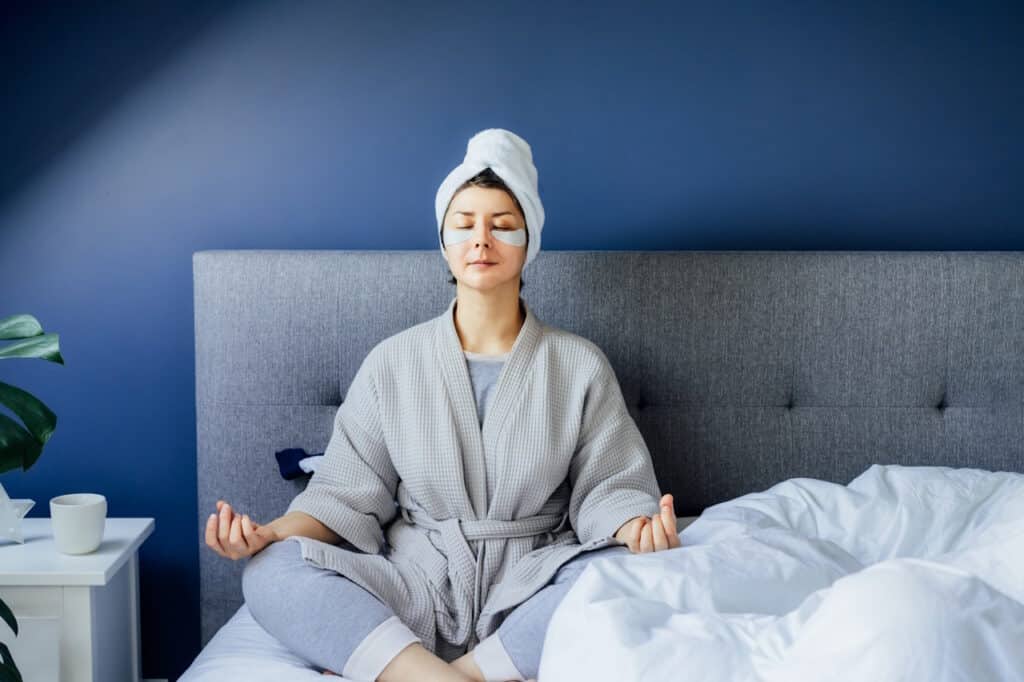
Although bedtime meditation is an obvious choice, you can practice meditation for sleep at any time of the day. The benefits of meditation are cumulative, meaning that regular practice can lead to overall improvements in sleep quality.
Whether you choose to meditate before bed or during the day, consistency is key. Regular practice will help you develop a calming meditation routine, allowing you to reap the benefits of improved sleep quality and reduced stress. So, find a time that works best for you and make meditation a priority in your daily life.
Additional Benefits of Meditation
Apart from improving sleep, meditation provides a range of other benefits. Regular meditation practice has been shown to:
- Reduce stress
- Relieve pain
- Improve mood
- Enhance creativity
- Boost memory
These additional benefits can contribute to a greater sense of well-being, making meditation an invaluable tool for overall health and wellness, including complementary and integrative health practices.
Whether you’re new to meditation or a seasoned practitioner, incorporating these techniques into your daily routine can have a profound impact on your life. By taking time each day to center yourself and cultivate mindfulness, you’ll not only enjoy better sleep but also experience a greater sense of balance, focus, and joy in your everyday life.
Risks and Considerations

Meditation is generally safe and beneficial, but it’s important to consider potential risks. In some cases, meditation can lead to feelings of anxiety, panic attacks, or even light injuries. Additionally, the effects of meditation on individuals with mental health issues or a history of trauma are not well understood, and these individuals may experience unknown risks.
If you have a history of mental health issues, such as post-traumatic stress disorder, approach meditation with caution and seek advice from a healthcare professional before starting. By being aware of potential risks and considering your unique circumstances, you can make an informed decision about whether meditation is right for you and your sleep needs.
Preparing for Bedtime Meditation
To maximize your bedtime meditation, create a serene, distraction-free environment that encourages focus and relaxation. This may include finding a quiet space, dimming the lights, and ensuring you have a comfortable place to sit or lie down.
As you prepare for meditation, choose a technique that resonates with you, such as mindfulness meditation, guided meditation, or one of the sleep-specific techniques mentioned earlier. Remember, the goal is to calm your mind and relax your body, setting the stage for a peaceful and restorative night’s sleep.
Incorporating Meditation into Your Sleep Routine
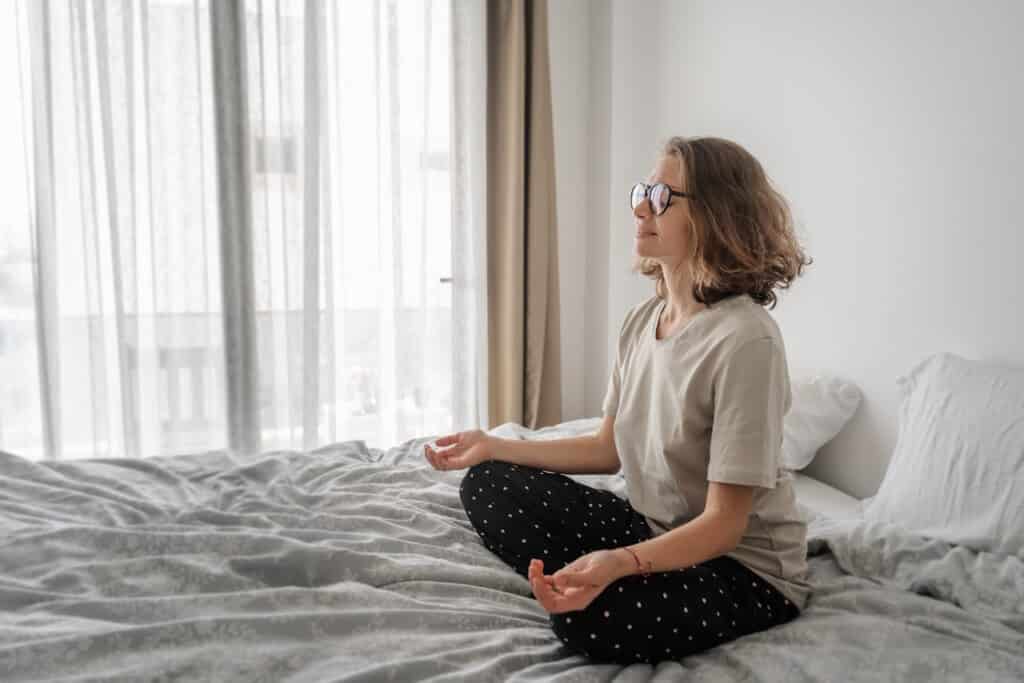
Adding meditation to your sleep routine might require some experimentation. It’s important to experiment with different techniques to find the one that works best for you and resonates with your personal preferences. Once you’ve discovered a meditation technique that helps you unwind and relax, make it a consistent part of your bedtime routine.
Remember that the benefits of meditation are cumulative, so regular practice is key to experiencing improved sleep quality and overall well-being. By dedicating time each day to meditation, you’ll be taking a proactive step towards better sleep and a more balanced, mindful life.
Expert Opinions and Recommendations
Experts in the fields of sleep and meditation agree that meditation can be a valuable tool for improving sleep quality and overall well-being. Numerous studies and expert opinions support the use of meditation techniques, such as mindfulness meditation, guided meditation, and sleep-specific practices like Yoga Nidra, Body Scan Meditation, and Mantra Meditation, to promote relaxation and better sleep.
Adhering to expert recommendations and adding meditation to your sleep routine is an investment in your physical, mental, and emotional health. As you develop a consistent meditation practice, you’ll likely experience improved sleep quality, reduced stress, and a greater sense of balance and clarity in your daily life.
Tips for Beginners
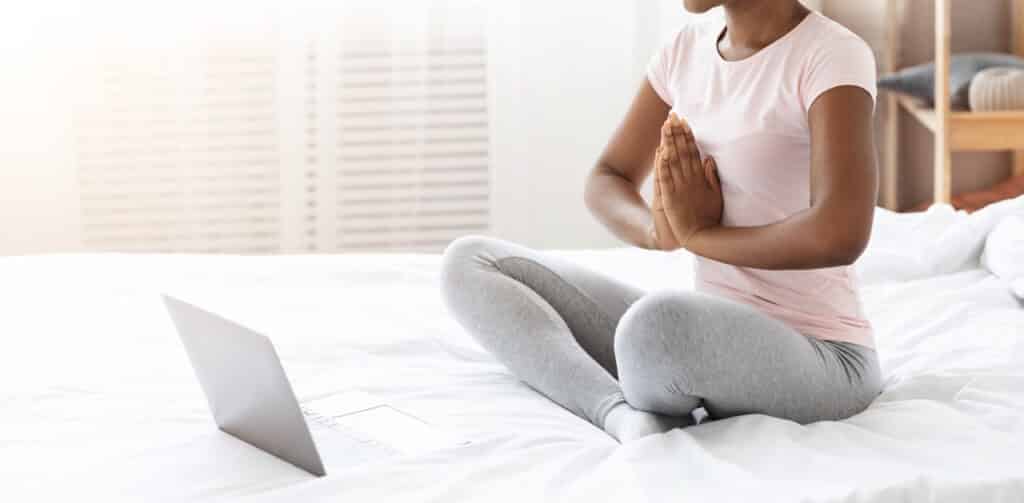
If you’re a meditation beginner, it’s advisable to start with brief, simple practices like focusing on your breath, conducting a body scan, or practicing mantra meditation. Regular practice, even if it’s just a few minutes a day, is key to experiencing the full benefits of meditation.
If you’re just starting out with meditation for sleep, here are some tips to help you get started:
- Start Small: Begin with short meditation sessions, even just a few minutes a day can make a difference. Gradually increase the duration as you become more comfortable with the practice.
- Find a Quiet Space: Choose a quiet, comfortable place where you won’t be interrupted. This could be a specific room in your house, a corner of your bedroom, or even a peaceful spot in your yard.
- Consistency is Key: Try to meditate at the same time each day. This helps to establish a routine and makes it easier to maintain your practice.
- Focus on Your Breath: One of the simplest ways to begin meditating is to focus on your breath. Pay attention to the sensation of inhaling and exhaling, and if your mind begins to wander, gently bring your focus back to your breath.
- Be Patient with Yourself: It’s normal for your mind to wander during meditation. Don’t be hard on yourself if this happens. Gently guide your focus back and continue your practice.
- Use Guided Meditations: As a beginner, guided meditations can be particularly helpful. These can be found on various apps or websites and provide step-by-step instructions for your meditation practice.
- Keep an Open Mind: Meditation is a personal journey and everyone’s experience is unique. Keep an open mind and find the practices and techniques that work best for you.
With patience, consistency, and an open mind, you’ll soon discover the transformative power of meditation and its ability to improve your sleep and overall well-being.
Summary
Meditation offers a natural and accessible solution to improving sleep quality and addressing common sleep issues. Techniques such as mindfulness meditation, guided meditation, Yoga Nidra, Body Scan Meditation, and Mantra Meditation can all contribute to a more restful night’s sleep and a greater sense of well-being.
As you incorporate meditation into your sleep routine, remember that consistency is key. By dedicating time each day to cultivating mindfulness and relaxation, you’ll be investing in your overall health and paving the way for better sleep and a more balanced, peaceful life.
Frequently Asked Questions
Is it better to meditate before or after bed?
Meditating before bed is a great way to wind down, reduce stress levels and insomnia, and enhance sleep quality. Regular meditation has also been proven to help people fall asleep twice as quickly and improve REM sleep states.
When should you not meditate?
If you are experiencing depression, mania, or anxiety, it is not the right time to start meditating. Seek help elsewhere first, and begin meditation when you’re in a stable period.
Is 10 minutes of meditation equal to 4 hours of sleep?
No, 10 minutes of meditation is not equal to 4 hours of sleep. According to a study by Oregon State University’s College of Business, it only replaces 44 minutes of sleep.
Can meditation really help me sleep better?
Yes, meditation has been shown to improve sleep quality and reduce insomnia symptoms, making it a great way to get a restful night’s sleep.
What types of meditation should I try for better sleep?
Try mindfulness meditation, guided meditation, Yoga Nidra, Body Scan Meditation, and Mantra Meditation for better sleep. These techniques are all effective in promoting relaxation and improved sleep quality.






